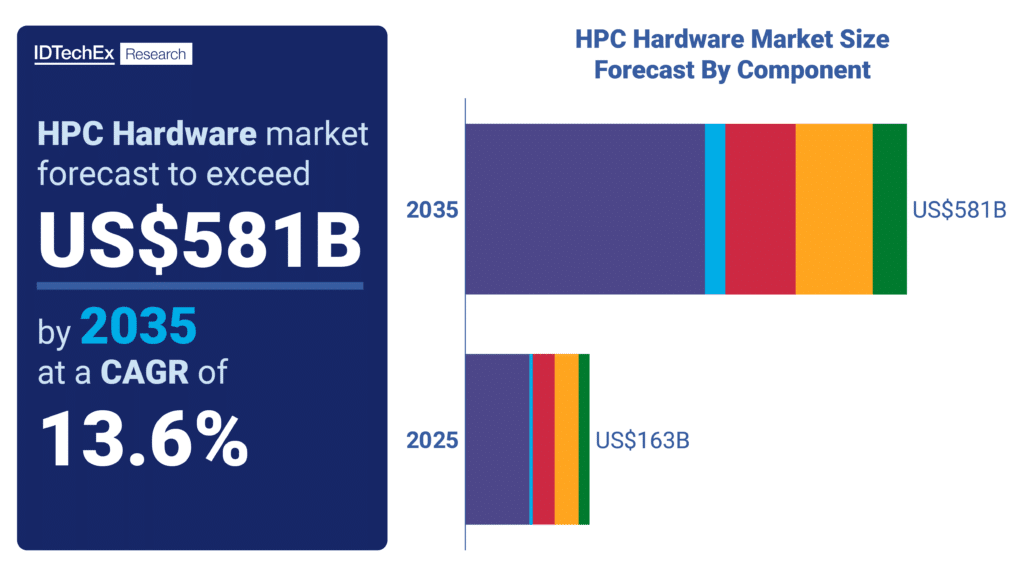HPC systems, including supercomputers, outclass all other classes of computing in terms of calculation speed by parallelizing processing over many processors. HPC has long been an integral tool across critical industries, from facilitating engineering modeling to predicting the weather. The AI boom has intensified development in the sector, growing the capabilities of hardware technologies, including accelerators, interconnects, and memory, at astounding rates.
The new report from IDTechEx, “Hardware for HPC and AI 2025-2035: Technologies, Markets, Forecasts“, predicts that the growing use-cases of AI and machine learning and scale of the largest AI models will drive significant growth in this already-large market. This results in a HPC hardware market forecast of US$581B by 2035, growing at a CAGR of 13.5% from this year.
 The HPC hardware market.
The HPC hardware market.
The largest exascale HPC systems in the world, which can perform over 1 quintillion high precision floating-point operations per second, are the preserve of government-operated national labs of global superpowers. However, private corporations are not far behind, with cloud providers like Microsoft Azure possessing supercomputers in the upper echelons of performance. Growth here is only expected to accelerate as the deployment of AI widens.
IDTechEx’s report examines the key hardware challenges in HPC, which revolve around processors, memory and storage, advanced packaging, interconnects, and thermal management. GPUs and other AI accelerators grab all the headlines in the processor space, with important trends including the adoption of cores for tensor processing within GPUs and hints of AMD challenging NVIDIA. However, substantial progress has also taken place in the CPU market, with core counts approaching 200 in chips like AMD’s Turin processors and the deployment of integrated heterogeneous systems – GPUs and CPUs integrated into the same package – taking place in the world’s most powerful supercomputers, including the USA’s El Capitan and China’s Tianhe-3.
In the memory space, the adoption of HBM (High Bandwidth Memory) has been crucial to the growing capabilities of accelerators, with approximately 95% of accelerators in HPC now employing the technology, but research into next-generation memory technologies such as selector-only memory (SOM), phase change memory (PCRAM) and magnetoresistive RAM (MRAM) is being driven by the high energy consumption of today’s memory choices. The quest for high-capacity storage that meets the increasing performance requirements of HPC workloads is seeing the emergence of high-density QLC SSDs at a lower cost-point than typical TLC SSDs available in the market.
Advanced packaging is a key enabler of all these chip technologies, with the 3D stacking of memory on top of logic being the best approach to achieve ultra-high bandwidths by shrinking on-device interconnect distances. Advanced packaging techniques are also highly important for the roadmaps of the interconnects between HPC nodes, as future iterations of low-latency networks like NVIDIA’s InfiniBand and HPE’s Slingshot move towards co-packaged optics to further reduce the distances data must travel at the chip scale and speed up throughput overall.
Of course, these advances evolve large amounts of heat, so thermal management performance is key. Despite immersion cooling’s strong performance in operational expense and performance, cold plate cooling is expected to remain the technology of choice in most cases as HPC builders seek to reduce the massive capital expenses that come with building these enormous interconnected machines.
For those needing to understand the HPC market, including the above trends and further challenges like the development of storage and the geopolitical dynamics that have affected the growth of this technology, IDTechEx’s new report is a must. At the dawn of the exascale era and in the most fruitful period for AI development yet, the demand for supercomputing is set for rapid expansion. As such, “Hardware for HPC and AI 2025-2035: Technologies, Markets, Forecasts” includes 10-year forecasts not only for the overall HPC hardware market but for key hardware technologies, including CPUs, GPUs, memory including HBM, storage, and server boards. Over 50 profiles of HPC hardware industry players are included. The reader will leave equipped with a wide-ranging, in-depth picture of the present and future of this exciting industry.
To find out more about the new IDTechEx report, including downloadable sample pages, please visit www.IDTechEx.com/HPC.
For the full portfolio of semiconductors, computing, and AI market research available from IDTechEx, please see www.IDTechEx.com/Research/AI.<
Sam Dale
Senior Technology Analyst, IDTechEx
Upcoming free-to-attend webinar:
How are Innovations in GPU Technology Driving the HPC and AI Markets?
Jameel Rogers, Technology Analyst at IDTechEx, will be presenting a free-to-attend webinar on the topic on Thursday 16 January 2025 – How are Innovations in GPU Technology Driving the HPC and AI Markets?<
The webinar will include:
- Understanding the current state of high-performance computing (HPC) and AI markets and hardware
- Exploring trends in GPU architecture, technologies, fabrication, and packaging of key HPC players
- Addressing challenges in GPU hardware, including moving to AI-specific processing, improvements to memory bandwidth and latency, and increasing transistor densities
- Discussion into the supercomputer and data center markets, and the influence of international trade on HPC and AI systems
We will be holding exactly the same webinar three times in one day. Please click here to register for the session most convenient for you.
If you are unable to make the date, please register anyway to receive the links to the on-demand recording (available for a limited time) and webinar slides as soon as they are available.
About IDTechEx
IDTechEx provides trusted independent research on emerging technologies and their markets. Since 1999, we have been helping our clients to understand new technologies, their supply chains, market requirements, opportunities and forecasts. For more information, contact [email protected] or visit www.IDTechEx.com.


